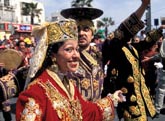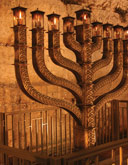×


We have detected your country as:
Please click here to go to the USA website or select another country from the dropdown list.

{image_1}
A moed is an appointed time when God asks His people to meet with Him. Moed is found 223 times in Scripture. It can be translated “set time, a specific appointment with God, appointed time, or solemn times, or congregation.” If you ask your Jewish friends what a moed is, most likely they will tell you that it is the feasts, referring to the biblical feasts listed in Leviticus 23. Type the word in Google, and you will quickly find links informing readers that moed is the name of the second Order of the Mishnah, the first written recording of the oral Torah (laws given to Moses not included in Scripture and not written down until AD 220). The twelve tractates (essays) of moed in the Mishnah relate to the Sabbath and the feasts, among other related topics.
Continue Reading »
By Marnus Schoeman, BFP Group & Guest Relations Manager
{image_1}This has been a question asked for centuries from generation to generation among the Jewish people during the Pesach (Passover) seder meal. You might wonder, why ask this question so long after Passover, which is celebrated in March–April? In August, The Land of the Bible Experience—an educational ministry of Bridges for Peace that provides Hebraic teaching through dramatic presentations—seized a wonderful opportunity to enact our Passover play to a tour group of 585 Nigerian Christians!
Continue Reading »
{image_1} Purim is the most wildly joyous of all the Jewish holidays. While it is not included in the list of feasts found in Leviticus 23, it is Bible-based, commemorating the story of Esther. My husband Tom and I have been celebrating the Levitical feasts for over 25 years, but even before we “discovered” these Feasts of the Lord, we were introduced to the feast of Purim.
Continue Reading »
{image_1} To much, if not all, of the Christian world, December is a very important month. It is filled with cooking, cleaning, entertaining, visiting friends and relatives…a constant flurry of activity, all focused on one holiday that acknowledges a defining moment in Christian history. For the Jewish people, December holds not one or two but eight days to celebrate events that occurred over 2,000 years ago. Hanukkah has become an integral part of the sequence of Jewish holidays celebrated annually and known as the festival cycle.
Continue Reading »
{image_1} Each of the biblical feasts has a symbolic food associated with it—even Yom Kippur (Day of Atonement), the most severe fast of the year. A pre-fast feast helps worshippers make it through the 25-hour fast, which is observed much like a Shabbat (Sabbath) meal, except it is eaten before sundown. Table linens and clothing are white to symbolize the hope of sins forgiven. The best dishes are used, two candles are lit, and blessings over the wine and bread are recited. Sometimes the bread is decorated with birds to remind them that just as birds fly, so their prayers will rise quickly and be answered.
Continue Reading »
{image_1}September–October always begins a new year for the Jewish people, but the Bible never calls these special days “Jewish” feasts. In Leviticus 23, they are referred to as the “feasts of the Lord.” Our faith life has been greatly enriched as we celebrate His feasts. We encourage you to add these feasts to your celebratory cycle.
Continue Reading »
{image_1}Tu’Bshvat is Israel’s Arbor Day, every year on the fifteenth of the Jewish month of Shvat, which falls this year on January 22. Though it is not a biblical holiday, it does have its roots in biblical law, as fruit had to be tithed according to its age, so a New Year for trees was created from which the age of all trees could be calculated.
Continue Reading »
{image_1}Etrog is Hebrew for citron, but what’s a citron? It is not a mystery in Israel, but it is for most of the world. An etrog is a lemon-like fruit, not commonly eaten by Israelis, but used during the harvest festival of Sukkot (Feast of Tabernacles). “And you shall take for yourselves on the first day the fruit of beautiful trees [citron], branches of palm trees, the boughs of leafy trees, and willows of the brook; and you shall rejoice before the LORD your God for seven days” (Lev. 23:40). The citron and lulav (branches) are waved before the Lord to the east, west, south, and north, up and down, acknowledging that God is everywhere.
Continue Reading »All logos and trademarks in this site are property of their respective owner. All other materials are property of Bridges for Peace. Copyright © 2024.
Website Site Design by J-Town Internet Services Ltd. - Based in Jerusalem and Serving the World.